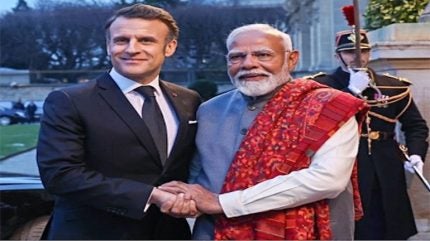
During Indian Prime Minister Narendra Modi’s historic to Paris, India and France signed 10 memoranda of understanding (MOUs) focusing on technology, nuclear energy and innovation. These included a Declaration on Artificial Intelligence (AI) and a Declaration of Intent for the establishment of partnership on advanced modular reactors (AMRs) and small modular reactors (SMRs).
Modi was in Paris to co-Chair the Artificial Intelligence (AI) Action Summit with French President Emmanual Macron, after which the two leaders travelled to Marseille to inaugurate the newest Consulate General of India. They also visited the International Thermonuclear Experimental Reactor (ITER) in Cadarache. This was Modi’s sixth visit to France and followed Macron’s visit to India in January 2024. While in Marseille, Indian Foreign Secretary Vikram Misri addressed a media briefing.
The India-France road map on AI will focus on the “development of safe, open, secure and trustworthy artificial intelligence”, a joint statement said. The declaration will focus on AI norms and standards that “reflect democratic values and harness the technology for common good”. It identified priorities and areas of cooperation and plans for a framework to ensure AI is developed in compliance with legal frameworks on intellectual property rights and privacy, while preventing discrimination and inequality or dissemination of disinformation.
As part of these efforts, India and France will foster industrial partnerships, such as in computing capacities, deepen research partnerships for developing open and freely reusable large language models (LLMs), encourage civil society initiatives on AI, strengthen cooperation on child safety online, and support the emergence of digital public infrastructure for AI by developing common resources in data, personal data protection and open source tools. India is preparing to host the next AI Summit later this year.
The partnership on AMRs and SMRs reflected renewed interest in India’s nuclear energy sector following the government’s recent move to amend the Atomic Energy Act and Civil Liability for Nuclear Damage Act and the allocation of some $23m in the 2025-26 budget for research and development including SMRs.
Misri told the media briefing that the two sides will collaborate in jointly designing, developing and producing SMRs and AMRS and also cooperate in training researchers and professionals in civil nuclear energy. Though the technology is still in its initial stages, such cooperation can help India leverage the existing industrial ecosystem for nuclear components and power plants, he said.
He noted that AI “essentially means electricity”, adding: “The amount of electricity that will be needed, if it is going to be sustainable, then it has to be something like nuclear power-driven electricity. And that is the area in which SMRs and AMRs can play a key role.”
Other development in civil nuclear cooperation included an agreement between India’s Department of Atomic Energy (DAE) and France’s Commissariat à l’Energie Atomique et aux Energies Alternatives (CEA) for cooperation between India’s Global Centre for Nuclear Energy Partnership (GCNEP) and France’s Institute for Nuclear Science & Technology (INSTN).
There was also an agreement between India’s Department of Science and Technology and France’s Institute for Research in Computer Science and Automation (INRIA) on setting up a centre for digital sciences, and an agreement for 10 Indian startups, mostly focused on AI, to be hosted at France’s Station F, the world’s largest startup campus.
The two countries also signed a Joint Declaration of Intent on Triangular Development Cooperation. Misri said this will allow India and France to leverage their capabilities in terms of financial support or technical collaboration to implement projects in third countries across the Indo-Pacific. India and France will identify and implement projects focused on the sustainable development goals and climate in priority sectors such as digital public infrastructure, clean energy, green technologies, education and health.
During their visit to ITER, Modi and Macron noted the progress being made in assembling the world’s largest Tokamak and appreciated the dedication of ITER engineers and scientists. This was the first visit by any head of state to ITER. India is among the seven ITER members contributing to the project over the last two decades. Around 200 Indian scientists and associates, as well as notable industry players such as L&T, Inox India, TCS, TCE, HCL Technologies, among others, are engaged in the project.
While in Paris, Modi also had a meeting with US Vice-President JD Vance. They “discussed topics of mutual interest, including how the United States can assist India in diversifying its energy sourcing through investments in clean, reliable US nuclear technology,” the White House said in a statement.






